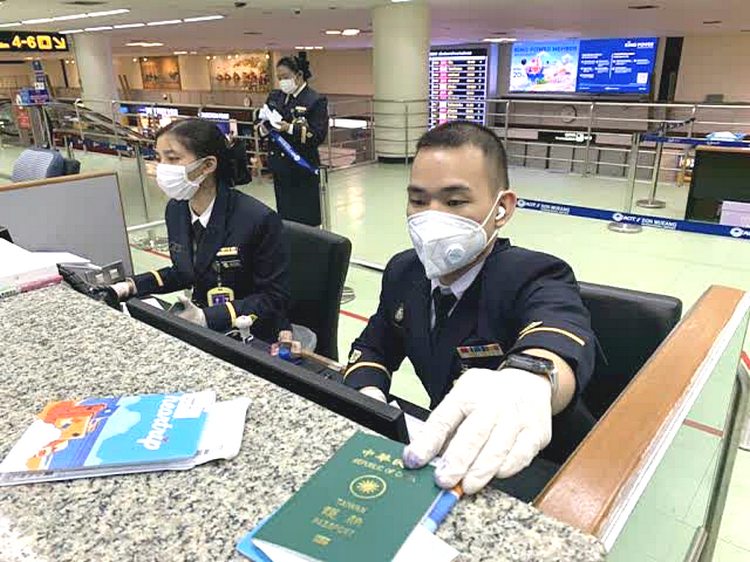Navigating the Thailand Visa Process
Thailand, often referred to as the Land of Smiles, has gained immense popularity as a destination for foreigners seeking to live, work, or visit. The country’s stunning landscapes, rich culture, and colorful cities, such as Bangkok, attract millions of visitors annually. Additionally, the favorable climate and low cost of living make it an appealing choice for expatriates looking for a new home. As a result, understanding the Thailand Visa Process is crucial for a smooth transition into the Thai lifestyle.
Thailand offers a diverse range of visa options tailored to different needs. Whether you are planning a short visit, a long-term stay, or considering a business venture, there is likely a visa to suit your circumstances. Tourists typically refer to tourist visas, which allow for short stays, while expatriates might explore work permits and other long-term visa options. It’s important to identify the right type of visa before making travel arrangements, including securing cheap flights to Pattaya or other destinations in Thailand.
Working and living in Thailand involves navigating the complexities of Thailand visa process. A comprehensive understanding of these requirements is essential to ensure compliance and avoid potential issues. Furthermore, many foreigners may need to deal with currency exchange in Pattaya or other areas while managing their finances in a different economic environment. Being aware of these details not only enriches the experience but also eases the transition.
As we delve deeper into this guide, we will explore the various types of visas available, alongside practical tips for foreigners embarking on their journey to Thailand. From understanding the necessary documentation to insights on cultural norms, this guide aims to empower readers with the knowledge needed for a successful immigration experience.
Types of Visas Available for Foreigners
When considering a move to Thailand, understanding the different visa categories is crucial for a smooth immigration process. Thailand offers various visa types catering to different needs, which include tourist visas, student visas, work visas, and retirement visas, among others. Each category has its own set of eligibility criteria and documentation requirements.
The tourist visa is one of the most popular options for travelers seeking to explore Thailand, including destinations like Pattaya. This visa typically allows foreigners to stay for up to 60 days, with the possibility of extending the duration if you wish to continue your journey. It is important to have valid travel documents and proof of onward travel to qualify for this visa.
Foreigners interested in studying in Thailand can apply for a student visa. The Thailand visa process requires enrollment in a recognized educational institution and comes with the advantage of allowing students to live in Thailand for the duration of their studies. Documentation usually includes proof of enrollment and adequate financial resources to cover living expenses.
Working in Thailand
For those looking to work in Thailand, the work visa is essential. There are several categories under work visas, such as the non-immigrant ‘B’ visa for business purposes. Applicants must secure a job offer from a Thai employer and are often required to provide additional documents such as a criminal background check and medical examination results. Work visas are vital for a legal employment status in Thailand and can sometimes lead to permanent residency.
Lastly, retirees can consider the retirement visa, which is accessible for foreigners aged 50 and above. This visa permits long-term stays in Thailand under certain financial requirements, such as holding a specific amount in a Thai bank account or a regular income source. Each visa type not only provides a legal stay but also offers unique benefits and limitations, making it critical to choose the one that best fits your circumstances. In conclusion, navigating the various visa categories available is essential for a successful Thailand visa process and lawful stay in Thailand.
The Visa Application Process
Applying for a visa to Thailand involves several steps that require careful preparation and understanding of the requirements. The first step is to determine the type of visa needed for your stay, as Thailand offers various visa categories, including tourist, business, and education visas. Once the appropriate visa type is identified, applicants must complete the visa application form, which can typically be obtained from the Thai embassy or consulate website or directly from the embassy. It is essential to fill out this form accurately, as errors can lead to delays or rejections.
Along with the completed application form, several documents are required to support the application. These documents generally include a valid passport with at least six months’ validity remaining, passport-sized photographs, proof of accommodation, and evidence of sufficient funds for the duration of stay. For some visa types, additional documentation may be necessary, such as business registration certificates for business visas or enrollment confirmation for educational visas. It is advisable to check the specific requirements at the embassy or consulate to ensure compliance.
Submitting the application can be done either in person or online, depending on the chosen visa type and local regulations. When submitting in person, it is recommended to arrive early to avoid long waiting times. For online applications, ensure that all documents are scanned clearly and uploaded correctly. Potential challenges during the application process may include language barriers, delays in document processing, and misunderstandings about requirements. Therefore, thorough preparation is crucial. To avoid common pitfalls, double-check all entries and documents before submission. By understanding the visa application process and preparing diligently, applicants can increase their chances of successfully obtaining a visa to Thailand.
Renewing and Extending Your Visa
Renewing or extending your visa in Thailand is a critical aspect of maintaining lawful residency, especially for foreigners who wish to continue enjoying the beautiful landscapes and vibrant culture of the country. It is advisable to begin this process well in advance of your visa expiration date to avoid any complications, such as overstaying your permitted duration in the country.
Typically, it is recommended to initiate the renewal or extension process at least one month before your visa expires. The procedures and necessary paperwork can vary depending on the type of visa you hold; thus, knowing the specific requirements for your visa category is essential. Gather all the necessary documentation, which generally includes a completed application form, a valid passport, photographs, proof of accommodation, and evidence of financial stability such as bank statements or proof of income. If you are applying for a long-term visa, you may also have to provide additional documents related to your employment or studies in Thailand.
When considering the renewal or extension of your visa, it is important to be aware of any fees involved. These fees can vary based on the type of visa and the length of extension requested. It is prudent to check the latest fees with the local immigration office or online to ensure you have the correct amount on hand when you submit your application.
In terms of timelines, processing can take anywhere from a few days to a couple of weeks, depending on the immigration office’s workload at the time of application. Therefore, early preparation is paramount. To maintain lawful residency during this period, always keep copies of your submission receipts and stay attentive to any correspondence from immigration officials.
Registering with Immigration Authorities
Registering with Thai immigration authorities is an essential requirement for foreigners looking to stay in Thailand for an extended period. This process ensures compliance with local laws and regulations, which is critical for maintaining legal residency status. Foreigners planning to settle in Thailand, particularly in popular destinations such as Pattaya or Bangkok, must familiarize themselves with the registration process to avoid any legal pitfalls that could arise from non-compliance.
Firstly, individuals who intend to stay in Thailand for more than 90 days must report their current address to the local immigration office. This notification can be done in person or through online services, depending on the local regulations. The immigration authorities require proof of residence, which could include rental agreements or property ownership documents. It is advisable to keep copies of all submitted forms and supporting documents to maintain clear communication with authorities.
Additionally, foreigners may need to provide details regarding their financial situation, especially when applying for long-term visas. This process often includes showing proof of sufficient funds through bank statements or other financial documentation. The currency exchange in Pattaya may also come into play when managing funds for visa applications. Understanding and accurately reporting one’s financial status can significantly affect the approval process.
Moreover, it is crucial to stay updated on any changes to immigration regulations that may occur during Your stay. Regularly checking official government websites or consulting with legal experts can provide vital information that will assist in fulfilling all registration obligations. Lastly, it is wise to schedule reminders for the reporting dates to avoid any lapses that could jeopardize your residency status.
In conclusion, registering with immigration authorities is a fundamental aspect of living legally in Thailand. By following the necessary procedures and remaining compliant, foreigners can enjoy their time in this vibrant country with no concerns about their immigration status.
Pathways to Permanent Residency
For many foreigners seeking to establish a long-term residence in Thailand, obtaining permanent residency represents a significant milestone. The pathways to this status are varied, each catering to different circumstances and needs of applicants. Understanding the eligibility criteria and the associated application processes is crucial for individuals aiming to secure their future in this vibrant nation.
Among the most common pathways to permanent residency is the option for those holding long-term visas, such as the non-immigrant B or O visas. Foreigners who have resided in Thailand on a long-term basis, typically for five consecutive years, may qualify for this pathway. Additionally, individuals who fall under specific categories, such as retirees or those married to Thai nationals, can also apply after fulfilling the duration requirements. Meeting certain income thresholds and demonstrating financial stability, particularly in regard to currency exchange in Pattaya or maintaining funds in Thai banks, is essential to support the application.
The application process for permanent residency involves a comprehensive assessment. Applicants are required to submit a plethora of documents, including financial statements, proof of residence, and background checks. The scrutiny of these documents ensures the integrity of the applicants and their intentions to contribute positively to society. Moreover, the Thai government emphasizes skills that foreigners can bring, particularly in sectors that are less saturated, aligning with local demands for talent and expertise.
The benefits of attaining permanent residency in Thailand are substantial. Permanent residents enjoy several privileges, including access to public healthcare services and the ability to work in any capacity without the need for a work permit. Additionally, the stability that comes from permanent residency fosters integration within local communities, paving the way for enriched social and cultural experiences. Thus, for anyone planning to settle long-term, navigating the pathways to permanent residency is a vital first step in securing their future in Thailand.
Understanding Thai Culture and Local Laws
Embracing cultural awareness and understanding local laws are essential for foreigners seeking to integrate successfully into Thai society. Thailand is a nation with rich traditions, unique customs, and a distinct legal framework that govern daily life. By familiarizing themselves with these aspects, expatriates can foster mutual respect and harmonious relationships with locals, which is crucial for a positive living experience.
Thai culture is deeply rooted in respect, particularly towards the monarchy and elders. It is significant to be mindful of the country’s laws regarding defamation of the royal family, as these can carry serious consequences, including imprisonment. Additionally, foreigners should understand that behaviors considered acceptable in their home countries may not be viewed the same way in Thailand. For instance, it is customary to greet someone with a ‘wai’—a gesture involving palms pressed together and a slight bow—signaling respect and politeness.
Etiquette plays a pivotal role in social interactions. Public displays of affection are typically reserved for private settings, and using a polite tone while communicating is important. As Thailand is predominantly Buddhist, understanding and respecting local beliefs, especially during important festivals or religious events, can go a long way in building rapport with Thai people.
Another critical aspect involves compliance with local laws. Foreigners in Thailand should be aware of specific regulations regarding visa requirements, work permits, and property ownership. Participating in currency exchange in Pattaya necessitates understanding the local financial regulations and ensuring that transactions comply with legal stipulations. Furthermore, as tourists and expatriates explore things to do in Bangkok or elsewhere in Thailand, adhering to local customs, such as observing dress codes in temples, is paramount. Familiarization with these social customs and legal requirements will significantly ease the transition for foreigners, allowing them to enjoy their life in Thailand while respecting the local culture.
Challenges Foreigners May Face in Immigration
Immigrating to Thailand can be a rewarding experience, yet it often comes with a set of challenges that foreigners must navigate. Bureaucratic hurdles frequently present significant obstacles, and individuals may face complications stemming from complicated paperwork and lengthy approval processes. It is crucial to thoroughly understand the specific visa requirements and adhere to them meticulously, as any oversight can lead to delays or denials. Thorough preparation can significantly mitigate such risks by ensuring all documentation is in order prior to submission.
Another common issue encountered during the immigration process is the language barrier. For many foreigners, Thai is a complex language to master, making communication with government officials and local services difficult. To counter this, many expatriates opt for language courses or utilize translation services. Moreover, it would be advantageous to familiarize oneself with key phrases in Thai, particularly those relevant to legal and bureaucratic contexts. Engaging the assistance of a local lawyer or consultant who is well-versed in immigration law can also alleviate misunderstandings that may arise due to language issues.
Cultural adjustments are another challenge faced by foreigners in Thailand. The customs and social norms may differ significantly from what individuals are accustomed to in their home countries. Having a clear understanding of local etiquette and expectations can prevent social faux pas that could complicate daily interactions or establish misunderstandings. Joining expatriate groups can offer valuable support and provide insights into navigating challenges such as currency exchange in Pattaya or finding affordable accommodation. These communities often share practical tips, including recommendations for trustworthy services and advice on essential things to do in Bangkok, which can ease the transition for newcomers.
Conclusion and Final Tips for Immigrants
Embarking on the journey of immigration to Thailand can be both exciting and daunting for many foreigners. Throughout this guide, we have navigated the multifaceted process, uncovering essential steps involved in securing a successful transition to life in this vibrant country. Understanding the nuances of visa types, residency requirements, and cultural adaptations can significantly smoothen this journey.
Preparation remains a cornerstone of tailoring one’s experience in Thailand. Thorough research into the various types of visa options is crucial, be it for work, study, or retirement. Familiarizing oneself with the local laws, customs, and even the currency exchange in Pattaya can aid in seamless integration into Thai society. Moreover, understanding the cost implications, such as finding cheap flights to Pattaya for eventual travel can make budget management easier as you settle into your new life.
Moreover, adaptability is vital. Embracing the unique cultural blend of Thailand, including the vibrant lives of women in Bangkok and the appealing attractions in the capital, can enhance your experience. Engaging with local communities and seeking advice from expatriates who have trodden a similar path can offer invaluable insights and support. Utilize local forums, social media groups, and expatriate clubs to build connections and gather advice that can guide your transition.
Remember, the immigration process is not merely a bureaucratic endeavor; it is a gateway to new experiences, friendships, and opportunities. Equip yourself with the right information and remain open to changes along the way. With careful planning and a positive mindset, your journey in Thailand can be immensely rewarding. As you take these next steps towards establishing your life in this amazing country, let confidence be your guide, ensuring a fulfilling experience in the Land of Smiles.







